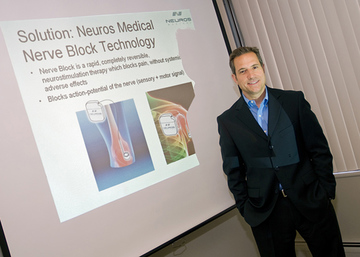It was 2008, and Jon Snyder wasn’t happy.
He had spent 25 years building a career in medical device sales, specializing in products that used neurostimulation to help patients with a variety of conditions manage chronic pain. He had worked all over the world as a biomedical executive, had a fantastic job in Chicago, and his family lived in a great neighborhood, went to great schools and had good friends.
But Snyder still felt empty and unfulfilled in his work.
“I could have stayed where I was,” he says now, “but using the ‘front porch’ test – where you visualize yourself sitting on the front porch in your later years of life – I wanted to ensure that what I was doing was really having an impact on someone’s life. “
So, when the opportunity to take over as CEO in Residence for Bio Enterprise in Cleveland came up, Snyder jumped at it. By his third day on the job he decided that it was time for him to finally start his own company. Remember, this was 2008. Only a true entrepreneur would attempt to build a new company in 2008.
Given his experience, Snyder knew that neurostimulation had the potential to truly change healthcare. He knew the market was there, he knew the technology was available, and he knew that there were others in the medical field who shared his vision. As fate would have it, there was a research team right in his backyard at Case Western Reserve University that was doing some interesting work with neurostimulation at the time. They soon teamed up with Snyder to form the core of what is now Neuros Medical.
Chronic pain is debilitating, and it’s something that affects both patients and their families. One patient testimonial indicated how their father “wasn’t engaged,” and was a “shell of the man he used to be.” It’s a terrible condition for all involved that, until recently, was very difficult to treat and often called for large doses of narcotic medications.
Neuros is working to change that, with trials of neurostimulation devices that are designed to alleviate the symptoms of chronic pain in ways that, until now, have not been widely available to patients.
“As we saw how pain was significantly diminished in our first study patients,” Snyder remembers, “you felt like you were at Kitty Hawk, watching a glider take off the ground. I got chills watching the patients respond to the device and still do.”
Neuros Medical’s technology is helping patients who suffer from the pain of amputation find significant relief. “These are veterans who literally lost a part of their life serving our country, and others who have lost a limb due to vascular disease or diabetes. I have the opportunity do something significant for them. It means everything.”
Results from two clinical studies to date have shown significant pain reduction in test subjects, and patients are also reporting a 90% reduction in their narcotic pain medication usage. Neuros currently has a third trial underway that will be used to support a submission to FDA for approval. Once that’s approved, Neuros will be able to launch the therapy to the market.
“We are at the five yard line, working to push it over the goal line,” Snyder says. “If we can provide patients with treatment options that don’t involve narcotics or other pain medicine, then that’s all the reason I need to get up in the morning.”






